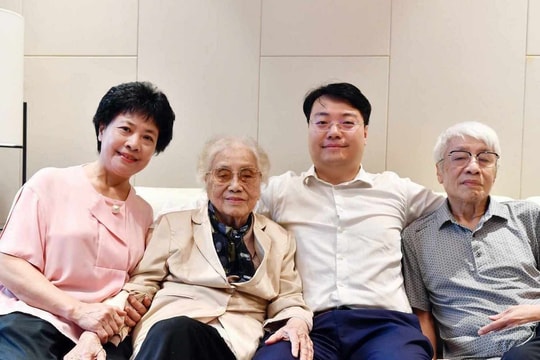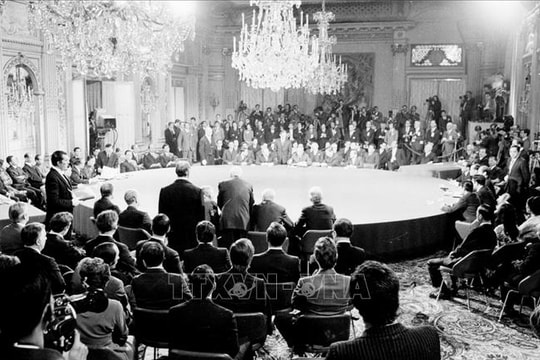Former Deputy Prime Minister Vu Khoan: Lessons in defending the country from the Paris Agreement 50 years ago are still valuable
The four philosophies that helped us win the Paris Agreement negotiations in the current context are still valid, only the way of expression must be adjusted to suit the current situation.
Exactly half a century ago today, January 27, 1973, the Paris Agreement on ending the war and restoring peace in Vietnam was officially signed in Paris (France). This was a historic milestone, the “door to peace” of our country in the resistance war against the US to save the country.
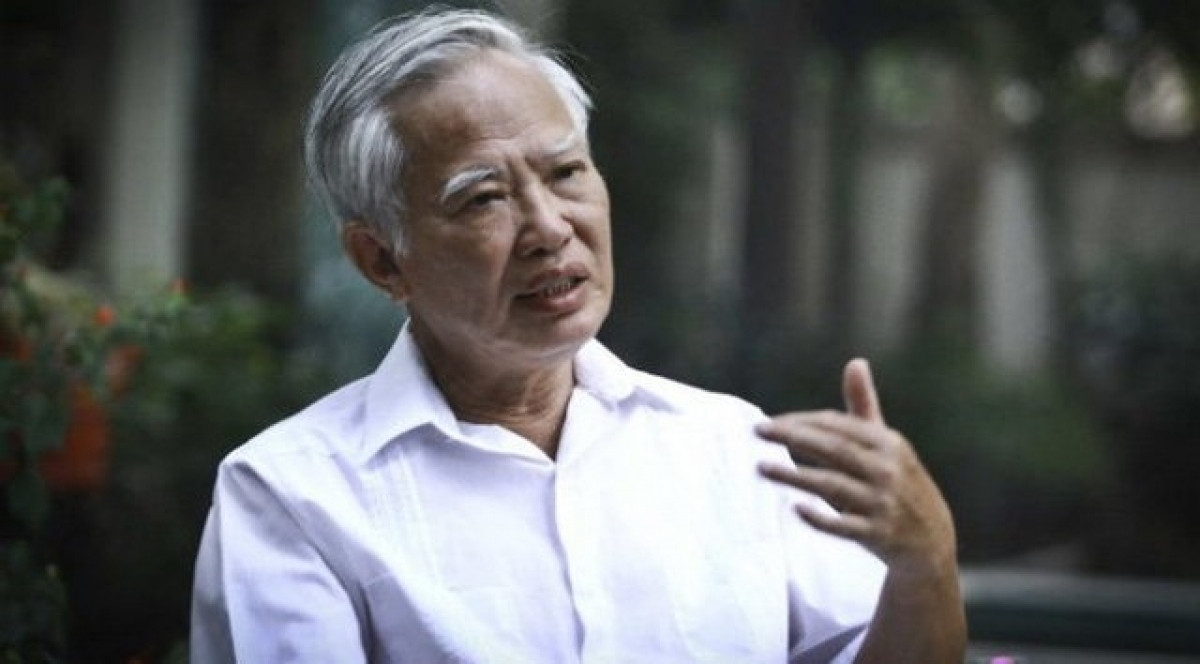 |
Former Deputy Prime Minister Vu Khoan. Photo: VTC.VN |
Former Deputy Prime Minister Vu Khoan, who was fortunate enough to join the Vietnamese delegation to France to sign the Paris Agreement, shared that the greatest significance of the Paris Agreement was that it completely changed Vietnam's position. For the first time, Vietnam took the initiative to sit on equal footing and negotiate with the US on a four-way basis. And then attended an international conference with 14 countries, including the "big 5", that is, the 5 permanent members of the United Nations Security Council and the UN Secretary General, to ensure the Paris Agreement.
Also in 1973, 15 countries recognized the Democratic Republic of Vietnam and established diplomatic relations, including major countries such as France, England, Japan, Belgium, Australia, Canada...
Reporter:Sir, during the negotiations in Paris, we were under pressure from many sides, under the influence of major powers, but we still firmly held our position demanding that the US withdraw all troops from the battlefield in South Vietnam. Is this considered a clear demonstration of our spirit of independence and self-reliance at the Paris negotiations table?
Former Deputy Prime Minister Vu Khoan:That spirit reflects Uncle Ho's philosophy, using our own strength to liberate ourselves. When preparing to enter the Paris negotiations, in 1967, the Central Committee held a meeting and for the first time put forward the policy that we would fight and negotiate at the same time. In it, it emphasized that we must be independent and self-reliant, and in reality we were independent and self-reliant, completely different from the Geneva conference. The Paris Agreement from beginning to end, from the preparation stage, all steps, demonstrated the policy that we were independent and self-reliant. Of course, we also sought support from our friends, but the plan was ours to decide.
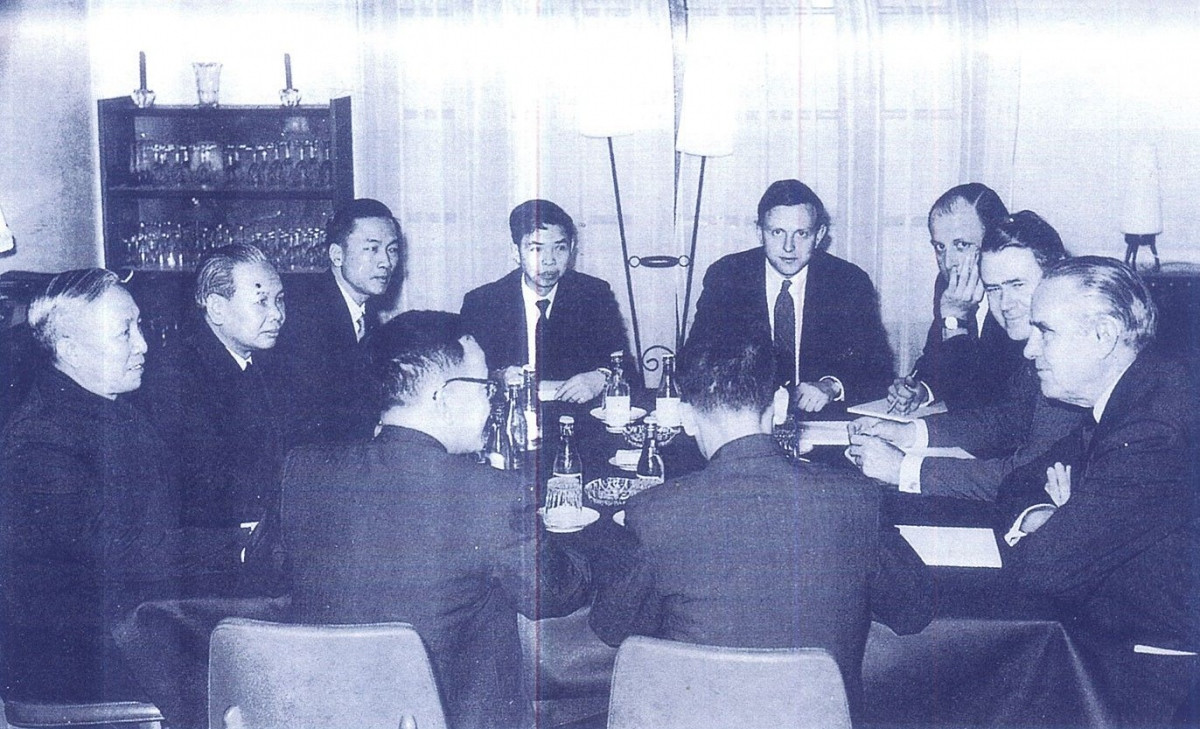 |
Private meeting between Special Advisor Le Duc Tho, Foreign Minister Xuan Thuy - Head of the delegation of the Government of the Democratic Republic of Vietnam with Head of the US delegation Harriman at the Paris Conference. (Photo courtesy) |
PV:In your opinion, is maintaining the spirit of independence and self-reliance considered the greatest lesson we have learned from the Paris Conference?
Former Deputy Prime Minister Vu Khoan: That is one lesson, but in my opinion, the Paris Agreement brings many lessons, not just one. Four lessons all start with the letter K. The first lesson is combination, the second lesson is steadfastness, the third lesson is perseverance, the fourth lesson is cleverness.
The first, related to the combination. We were a relatively small country, very poor at that time. But history placed on our people a very heavy mission, always having to face forces much more powerful in material terms. If we faced it alone, it would not be simple. Therefore, our Party from the beginning advocated combining national strength with international strength. At that time, we had a philosophy, which was to form 3 fronts. The first front was national unity, all classes of people stood up to protect the Fatherland. The second ring was to unite the 3 countries on the Indochina peninsula, with the same fate. And the third belt, the third front (a larger ring), that is, the people of the whole world. We formed a front with many rings like that, to create a much greater strength. Our struggle in general and the Paris Agreement in particular had a very large front, which was the people of the world, including the people of the countries that invaded us.
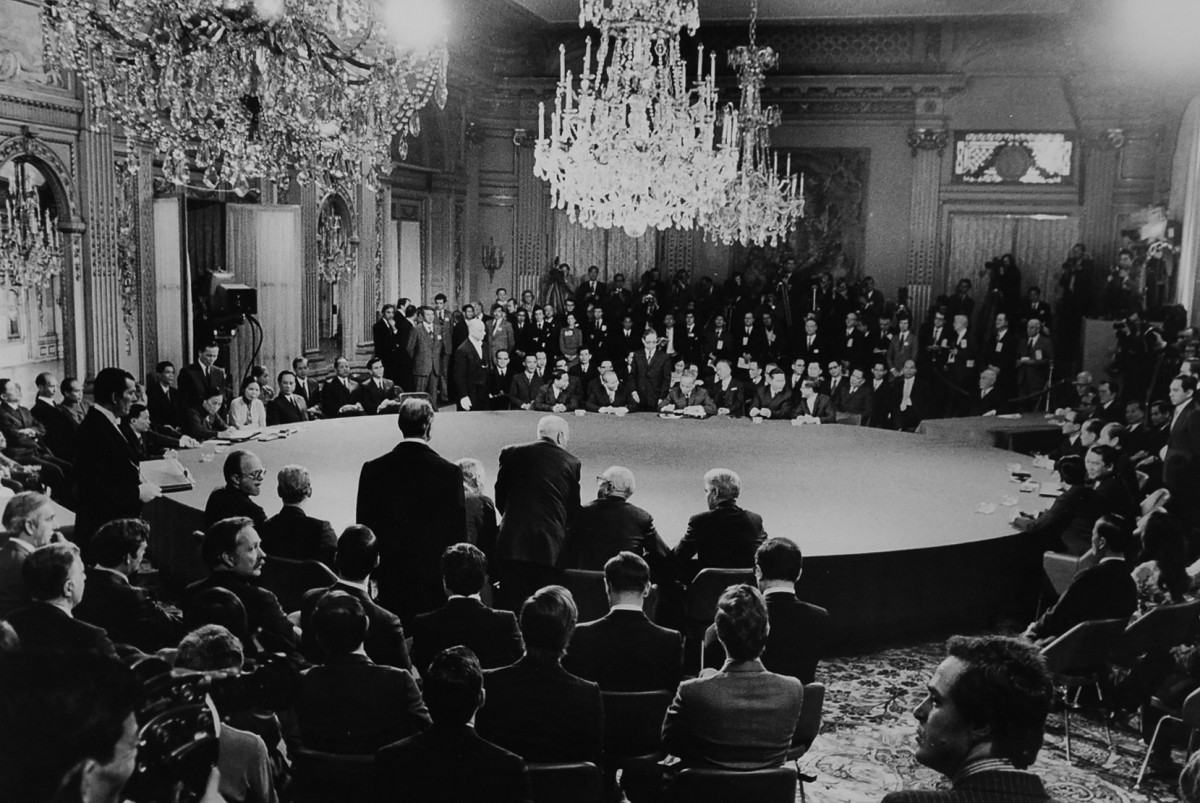 |
The Paris Agreement was signed on January 27, 1973 after nearly 5 years of negotiations. (Photo courtesy) |
PV:You have just analyzed the first K of the four Ks drawn from the Paris Conference. What about the second K, which is determination, how was this expressed at the Paris negotiating table?
Former Deputy Prime Minister Vu Khoan: Resolutely expressed in the viewpoint as Uncle Ho instructed "fight to make the Americans go away, fight to make the puppets fall". During the negotiation process, we were consistent in two things. First, you must recognize the independence, sovereignty, territorial integrity of Vietnam, and the right to self-determination of the Vietnamese people. Vietnam's affairs are decided by Vietnam. That is the premise that we will not waver or change. And the second thing is that the US must definitely withdraw its troops completely and thoroughly from Vietnam. As for the Vietnamese army, whether in the South or the North, they are on Vietnamese soil, there is no way they can withdraw, they cannot withdraw from our country.
PV:It is because of determination that we need to persevere to be able to achieve the goal of forcing the Americans to accept signing the Paris Agreement, right sir?
Former Deputy Prime Minister Vu Khoan: That's right, because we are facing a very powerful force. So, we cannot solve it overnight, we cannot fight quickly and win quickly, but we must be very persistent, it is called progressing step by step, we must go step by step, even the Paris negotiations have that nature. There is no negotiation about ending the war that lasts nearly 6 years, haggling like that with each other. That is also a way of being persistent, it cannot be done overnight.
We remember Uncle Ho's appeal in 1967, when the US intensified its bombing of the North. He declared that the war could last 5 years, 10 years, 20 years or even longer. Hanoi, Hai Phong and some cities and factories could be destroyed, but the Vietnamese people were determined not to be afraid, nothing was more precious than independence and freedom. That was the ideology, the call of the mountains and rivers, a source of motivation for the resistance war and demonstrated the very high determination of our people.
PV:With the four K's of combination, perseverance, determination and cleverness as you just analyzed, what does that mean for us in implementing our current foreign policy, especially in the international context where strategic competition between major countries is having direct impacts on national interests?
Former Deputy Prime Minister Vu Khoan: Actually, those basic philosophies are still valid. Only the way of expression has to be adjusted to suit the current complicated situation.
The past few years, especially 2022, have been a turbulent year, with developments that can be said to be of the era, of the century, not just temporary, requiring us to be determined, to be even more determined, to be flexible, to be even more flexible. We often joke with each other that people say Vietnam often walks on a tightrope, that is, the image of a circus artist walking on a tightrope, overcoming all difficulties and challenges. I still joke with my brothers that we must continue to walk on a tightrope. But that tightrope is now much thinner, so we must be even more agile, flexible, and clever. Cleverness does not mean being pragmatic, it does not mean lying. But cleverness comes from the interests of our nation, from the world situation.
We must be more independent, more self-reliant, more intelligent, more diversified and always maintain and support multilateralism. Because in this world, no one can run away. In the end, they still have to live on earth. If we are on earth together, we have to find a way to live together. So let us find a way to live together peacefully, cooperatively, to win together, not to lose together.
PV:Thank you very much./.

